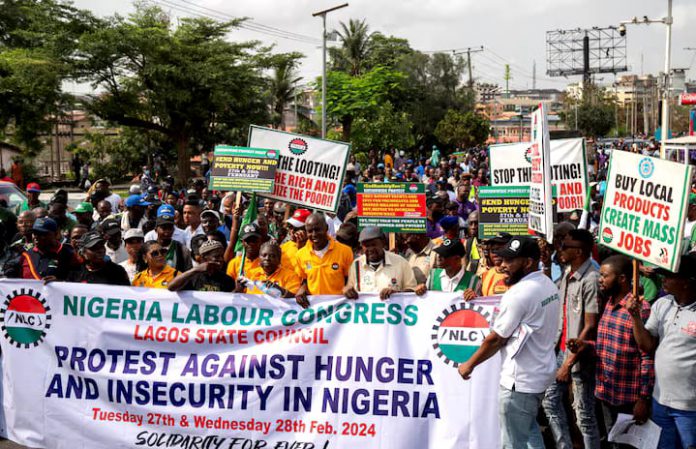Ahead of planned Thursday protests against the high cost of living and poor governance, Nigerian security forces were deployed in major cities as the government said it is open to dialogue.
After taking office more than a year ago, President Bola Tinubu swiftly removed fuel subsidies, devalued the naira currency and later hiked electricity tariffs, moves that have sent inflation soaring past 34%, eroding incomes.
Nigerians are also grappling with widespread insecurity, which has damaged the farming sector, while armed gangs kidnap residents and school children for ransom in the north.
Inspired by Kenyan protests, Nigerians are mobilising online to demand the reinstatement of petrol and electricity subsidies, free primary and secondary education and an end to insecurity, among other demands.
Secretary to the Government of the Federation (SGF), George Akume, said the protests could be infiltrated and become violent without elaborating.
“We prefer dialogue, we are ready for dialogue,” he told reporters, without saying whether the government had been in contact with the protest organisers.
“Nigeria is a work in progress and things will soon improve.”
Tinubu’s government has so far used a mix of threats and cajoling to discourage the protests.
In the capital Abuja, the commercial hub Lagos and the northern city of Kano, armed police deployed on major roads, set up security checkpoints and searched cars.
Police occupied the main square in Abuja that protesters planned to use, while military vehicles parked nearby.
A court order confined Lagos protesters to two venues on the outskirts of the city.
Some Lagos residents said they were worried that protests could turn violent as happened during EndSars, in October 2020, when lives were lost and properties destroyed.
At one of Kano’s largest malls, Sufi Mart, workers were busy reinforcing windows with shutters.
“I don’t want it (the protest) to extend into the night so that it doesn’t turn out to be another thing like EndSars,” said Nneka Ochiachebe, who sells second-hand clothes at a Lagos market.











